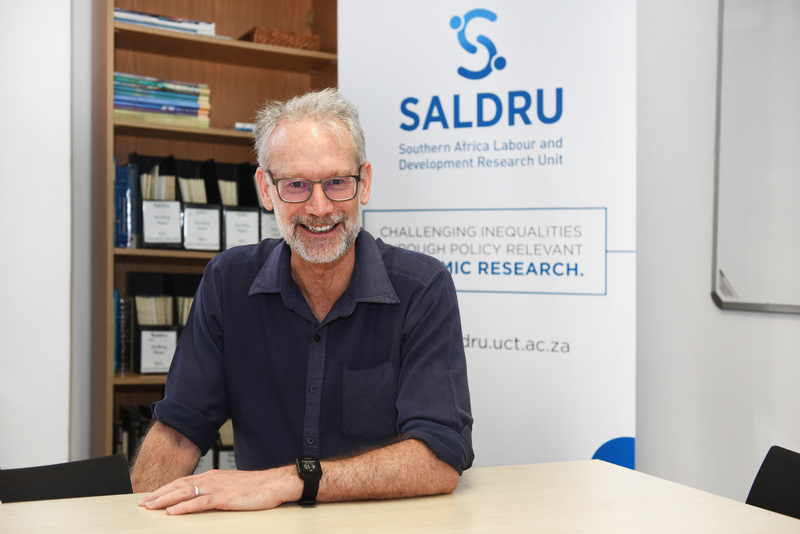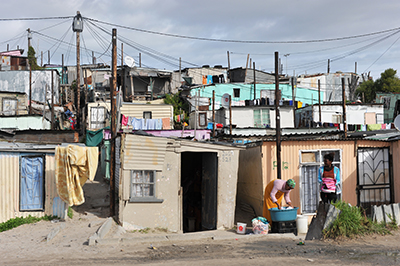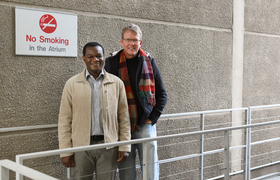SALDRU: Rebooted and on a mission
23 March 2018 | Story Helen Swingler. Read time 8 min.
The Southern Africa Labour and Development Research Unit (SALDRU), one of UCT’s oldest and most respected research units, has a new mission statement and logo. Recently launched, the logo reflects the recommitment of the unit and its many projects, a formidable cohort of researchers working in the fields of poverty, inequality and the labour market.
Cartoonist Tony Grogan’s iconic miner-at-the-rock-face logo, symbolising SALDRU’s initial focus on migrant and farm labour issues in the apartheid era, has been replaced by a symbol that is more reflective of the unit’s expansion and diversity.
Their revised mission, “Challenging inequalities through policy-relevant academic research”, was inspired by the unit’s changing external context, says director Professor Murray Leibbrandt, the pro-vice-chancellor of UCT’s Poverty and Inequality Initiative.
“The unit’s refocusing recognises the need to bring together its diverse work groups and projects in a more integrated way; providing big picture analysis of how best to crack persisting inequality and poverty in the country and on our continent.”
Persistent poverty and inequality are tough nuts to crack, argues Leibbrandt. The aim is for SALDRU to corral individual efforts and many projects − as diverse as education, health, youth, land restitution, social grants and tobacco control − towards creating not only evidence-based policy, but also broad strategies to overcome poverty and inequalites in the country.
SALDRU deliberately highlights the plural “inequalities” to call attention to the multidimensional ways in which inequality affects the potential of citizens. The emphasis on policy relevance expresses the significance SALDRU attaches to engagement with national policy debates.
Taking stock
With the unit’s 50th anniversary in mind, it was time to take stock, says Leibbrandt. This he did at SALDRU’s annual general meeting in September 2017, to “reflect honestly about this moment and the demands on us as researchers”.
“This brings us back to contemporary South Africa and how it works; how people get trapped in this persistently unequal society and what the solutions are to break these traps.”
Many of the answers can be found in understanding intergenerational mobility; the passing on of privilege, better education, better health and better opportunities.
“It all becomes manifest in the labour market intergenerationally,” says Leibbrandt. “Kids are in remarkably similar positions in the occupational distribution to their parents. It’s devastating and such a terrible critique of our country. Most children have three to four years better schooling than their parents. But that doesn’t translate at all into better outcomes in the labour market – or better life prospects.
“If we aggregate across all the work taking place in SALDRU, there is the potential to make a serious contribution to understanding the dynamics; the individual components as well as the intersection of these components and how the whole fits together.”
Deep roots
“For more than four decades SALDRU has built a substantial body of research and a reputation for data gathering and analysis of the dynamics of poverty and inequality at that point in time,” adds Leibbrandt.
SALDRU spent nine months in the run-up to South Africa’s first democratic elections in 1994 gathering data about the living standards of South Africans to feed into the Government of National Unity’s Reconstruction and Development Programme (RDP). That survey, known as the Project for Statistics on Living Standards and Development, was groundbreaking research because the apartheid government had never done a nationally representative social survey of all households, which included black South Africans.
In the 2000s SALDRU partnered with the Centre for Social Science Research on the Cape Area Panel Study, a longitudinal study of 4 700 youth to track how life was working out for them.
In 2007 the Policy Unit in the Presidency (now the Department of Planning, Monitoring and Evaluation) contracted the unit to implement the National Income Dynamics Study (NIDS) to document the unfolding lives and livelihoods of 28 000 South Africans every two years. The information is central to understanding the dynamics of poverty and shaping the policies that drive social upliftment.

“Collecting a vast pool of data and making it available to policymakers, planners, researchers and strategists was a huge investment for the country. SALDRU is proud to have played a part in this important project,” says Leibbrandt.
Now in its fifth wave, NIDS is also a huge affirmation of the unit’s research strengths and capacity.
There were other significant events. The unit’s founder, Emeritus Professor Francis Wilson, was instrumental in SALDRU hosting the Second Carnegie Inquiry into Poverty and Development in South Africa in 1984, which described poverty in South Africa in the 20th century, the result of a “bipolar” political economy.
“Collecting a vast pool of data and making it available to policymakers, planners, researchers and strategists was a huge investment for the country.”
In 2012, spurred by Trevor Manual’s National Planning Commission, which needed broad input for the National Development Plan, UCT hosted “Strategies to Overcome Poverty and Inequality: Towards Carnegie III”. In less than 18 months, some 400 papers were convened from researchers around the country.
“That think tank became the Mandela Initiative for Strategies to Overcome Poverty and Inequality,” says Leibbrandt. The project has been handed over to the Nelson Mandela Foundation.
Consolidate and cohere
SALDRU’s focus for the next five years will be on greater consolidation and cohesiveness to work not only on policy shaping evidence, but also to delineate strategies to overcome inequality.
“It’s important that we use our collective strengths within SALDRU as a hub for our researchers − all doing valuable work within the broader themes of poverty and inequality and labour markets − so that we don’t become Balkanised.
“It’s a bit of a buy-in moment.”
In launching the new mission and logo, Leibbrandt says the unit was reaffirming their collective work and contributions to the nation and the welfare of its people.
The timing is dead right.
“Government seemed to have ‘lost its fire’ for evidence-based policy. However, the fresh breeze sweeping through South Africa’s political establishment ought to create more spaces and opportunities for academics to engage with national policy,” he adds.
While affirmation from government is good, it’s not essential to SALDRU’s mission.
“This is our country and our duty as researchers is to ensure that we have the right evidence in place to underpin an inclusive development strategy. We are determined to make an aggregate contribution − that’s greater than the sum of our parts − to [cracking our] inequalities.
“Everyone has a part to play, from the school governing body to the NGOs and civil society organisations. We need all hands on deck.
“When one is in the trenches each day as part of this research unit doing this important work, you know you are doing your research as well as you can to be part of something bigger.”
 This work is licensed under a Creative Commons Attribution-NoDerivatives 4.0 International License.
This work is licensed under a Creative Commons Attribution-NoDerivatives 4.0 International License.
Please view the republishing articles page for more information.










